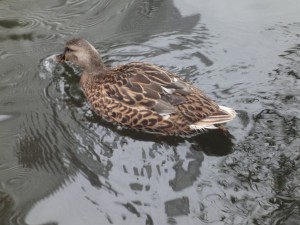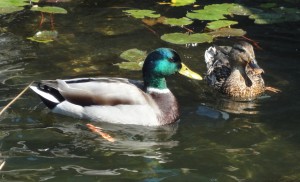This post has been read 2450 times!
September 25, 2010
One of the male mallards has changed into full mating plumage much sooner than the others, and seems to have chosen a mate already.
August 31, 2010
Coincidentally, on the same day President Obama gave a primetime speech to announce that all combat troops had left Iraq, BatteryPark.TV is glad to announce “Mission Accomplished” too with Project Duck. The last straggling duckling that was developing flight feathers more slowly than the others finally flew away today.
(The last duck to fly, shown here two weeks ago with wingtip feathers still growing)
Every single one of the ten ducklings that was present on May 31 when we first began reporting on the stranded ducklings survived to adulthood and flew away. This was possible only due to a collaboration of various conscientious volunteers in the community, ranging from the Parks Conservancy staff who fed them when they were smallest, to other concerned residents of Battery Park City.
The waterfall pond had zero ducks in it at 6:00 PM today. Now, it’s just the old faithful overgrown goldfish left. However, the ducks return daily, so you will still be able to see them, and more strangers from Up North will land and visit in about a month, as they did last year. There are already three stranger mallard ducks hanging out.
August 17, 2010
The dynamics of the little Duck Utopia have been greatly altered. Four stranger adult male mallards flew into town and are hanging out in the waterfall pond during the day. They can be spotted by their slightly larger size and behavior. They do not associate in close proximity with the nine siblings that grew up in the pond. One of the adult males is also acting territorial, almost in pre-mating rituals. The mother is not around much these days.
The young siblings seem to be learning from the new adults and are flying more often. This evening, all but two of the ducks flew the coop for the evening. One duck has had slow development of the flight feathers on her wings and another seems too small to fly with the pack.
August 11, 2010
A male duck landed in the waterfall pond today and was a bit larger than the others. It might have been one of the siblings that flew away 5 days ago. It began to lead the group around the pond and bob his head. Then suddenly, he took flight toward the Hudson taking with him one of the ducks on its first flight.
The remaining ducks took short flights but aborted them within the pond. They all hopped up to the highest rim of the pond and gazed westward. Then, suddenly again, three of them got the courage to fly away. They circled nearby over the Hudson for more than a two minutes. One returned to the pond. There are now six ducks in the pond.
August 6, 2010
One of the ten former ducklings flew out of the waterfall pond sanctuary for the first time today and went on an overnight expedition with the mother. Their behavior is to return in the morning. The rest are doing test flights the length of the pond. Unlike last year where only two ducklings survived, and only one of those had the nutrition to develop flight wings, all ten this year are doing well, thanks to the care given by the BPC Conservancy staff.
Fellow duck enthusiasts have asked some common questions and here are the answers.
Q1 Are they all females?
A: No. They will not differentiate into the colorful male plumage until next year. For now, the only distinguishing marks are the color of the bills. The males have green bills. Also, the mature males lose their colorful green plumage a month or so after the eggs hatch and develop a more protective camouflage brown color.
Q2 When will they fly?
A: Mallard ducklings can fly as soon as 50 days after hatching. Our ducks are almost 90 days old and have the fully developed wing feathers for flight. Being citified ducks, they seem to be a bit lazy and comfortable where they are.
Q3: When will they leave for good?
A: They will likely stick around in the pond until November. The mother will stay with them until next year.
Q4: Will they return next year?
A: Yes. They will likely return and nest again nearby.
httpv://www.youtube.com/watch?v=01j7up57aQk

